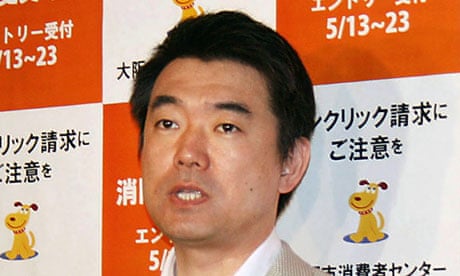An outspoken nationalist mayor has said the Japanese military's "comfort women" regime of forced prostitution of Asian women before and during the second world war was necessary to maintain discipline in the ranks and provide rest for soldiers who risked their lives in battle.
The comments raised ire in neighbouring countries that bore the brunt of Japan's wartime aggression and have long complained that Japan has failed to fully atone for wartime atrocities.
Toru Hashimoto, the young, brash mayor of Osaka who is also co-leader of an emerging conservative political party, said on Monday there was no clear evidence that the Japanese military coerced women to become what are euphemistically called "comfort women".
"To maintain discipline in the military it must have been necessary at that time," said Hashimoto. "For soldiers who risked their lives in circumstances where bullets are flying around like rain and wind, if you want them to get some rest a comfort women system was necessary. That's clear to anyone."
Historians say up to 200,000 women, mainly from the Korean peninsula and China, were forced to provide sex for Japanese soldiers in military brothels. By some estimates 75% died in captivity.
An unidentified South Korean government official told the Yonhap news agency it was disappointing that a senior Japanese official had "made comments supportive of crimes against humanity and revealed a serious lack of a historical understanding and respect for women's rights".
Hashimoto's comments come amid mounting criticism at the prospect of the prime minister, Shinzo Abe, and his conservative government revising Japan's past apologies for wartime atrocities. Before he took office in December, Abe had advocated revising a 1993 statement by the then PM, Yohei Kono, acknowledging and expressing remorse for the suffering caused to the sexual slaves of Japanese troops.
Abe has acknowledged that comfort women existed but has denied they were coerced into prostitution, citing a lack of official evidence.
Recently top officials in Abe's government have appeared to backpedal on suggestions the government might revise previous apologies, apparently to calm tensions with South Korea and China and address US concerns about Abe's nationalist agenda.
The chief cabinet secretary, Yoshihide Suga, repeated the previous government position and said the women went through unbearable pain.
"The stance of the Japanese government on the comfort women issue is well known. They have suffered unspeakably painful experiences. The Abe cabinet has the same sentiments as past cabinets."
The education minister, Hakubun Shimomura, said Hashimoto's comments were of no help.
"A series of remarks related to our interpretation of [wartime] history have been already misunderstood. In that sense Mr Hashimoto's remark came at a bad time," Shimomura said. "I wonder if there is any positive meaning to intentionally make such remarks at this particular moment."
Hashimoto, 43, is co-head of the newly formed Japan Restoration party with the former Tokyo governor Shintaro Ishihara, who is a strident nationalist.
Sakihito Ozawa, the party's parliamentary affairs chairman, said he believed Hashimoto's remarks reflected his personal view but expressed concerns about repercussions. "We should ask his real intentions and stop this at some point," he said.








Comments (…)
Sign in or create your Guardian account to join the discussion